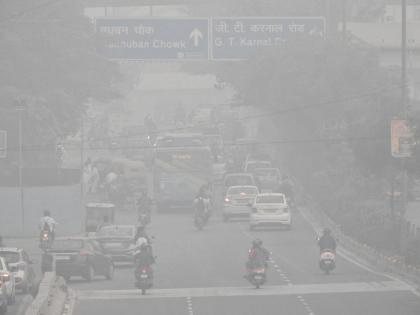Delhi: Centre Bans Non-Essential Construction Work As Air Quality Worsens
By Lokmat English Desk | Published: December 22, 2023 07:11 PM2023-12-22T19:11:13+5:302023-12-22T19:11:32+5:30
As the national capital grapples with a concerning surge in air pollution levels, the central government has taken decisive ...

Delhi: Centre Bans Non-Essential Construction Work As Air Quality Worsens
As the national capital grapples with a concerning surge in air pollution levels, the central government has taken decisive measures to address the escalating crisis. According to PTI reports, non-essential construction work has been banned in the Delhi-NCR (National Capital Region). This move comes in response to the activation of Stage-3 restrictions under the Graded Response Action Plan (GRAP) to combat the deteriorating air quality in Delhi.
The overall Air Quality Index (AQI) for Delhi has exhibited a steady rise since Friday morning. At 10 am, the AQI stood at 397, and by 4 pm, it had further increased to 409. Alarmed by these deteriorating conditions, the governments of Haryana and Uttar Pradesh have been urged to consider discontinuing physical education classes due to the declining air quality.
Unfavourable meteorological conditions, characterized by fog and haze with low wind speed, have been identified as major contributors to the sudden spike in Delhi's daily average AQI. The Commission for Air Quality Management (CAQM), a statutory body responsible for formulating pollution combat strategies, emphasized these factors in its recent order.
Under the reinstated Stage-3 restrictions of the GRAP, the CAQM has ordered a comprehensive ban on non-essential construction work, stone crushing, and mining activities in Delhi-NCR. However, exceptions have been made for construction projects related to national security or defence, projects of national importance, healthcare, railways, metro rail, airports, interstate bus terminals, highways, roads, flyovers, overbridges, power transmission, pipelines, sanitation, and water supply. Moreover, Stage-III restrictions extend to the operation of BS-III petrol and BS-IV diesel four-wheelers in specific areas, including Delhi, Gurugram, Faridabad, Ghaziabad, and Gautam Budh Nagar.
The GRAP, implemented by the central government during the winter season, categorizes actions into four stages based on the AQI: Stage I - 'Poor' (AQI 201-300); Stage II - 'Very Poor' (AQI 301-400); Stage III - 'Severe' (AQI 401-450); and Stage IV - 'Severe Plus' (AQI > 450). Data analysis reveals that vehicles contributed to 35% of the PM2.5 concentration in Delhi on Thursday at 5 pm, with biomass burning accounting for 34%, and burning of plastic and waste contributing an additional 6%. A comparison with the previous day's data at the same time indicates a shift, with vehicles contributing 61%, biomass burning contributing 20%, and waste burning contributing 1%.
Open in app